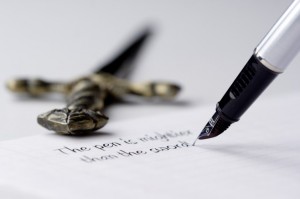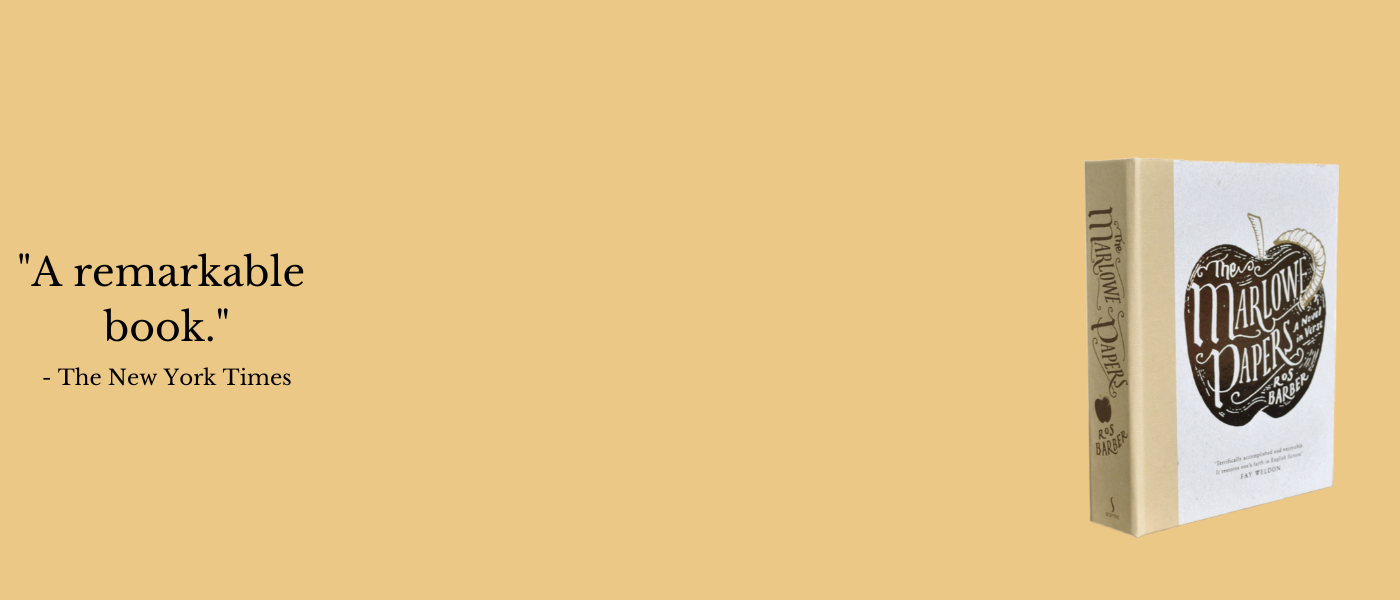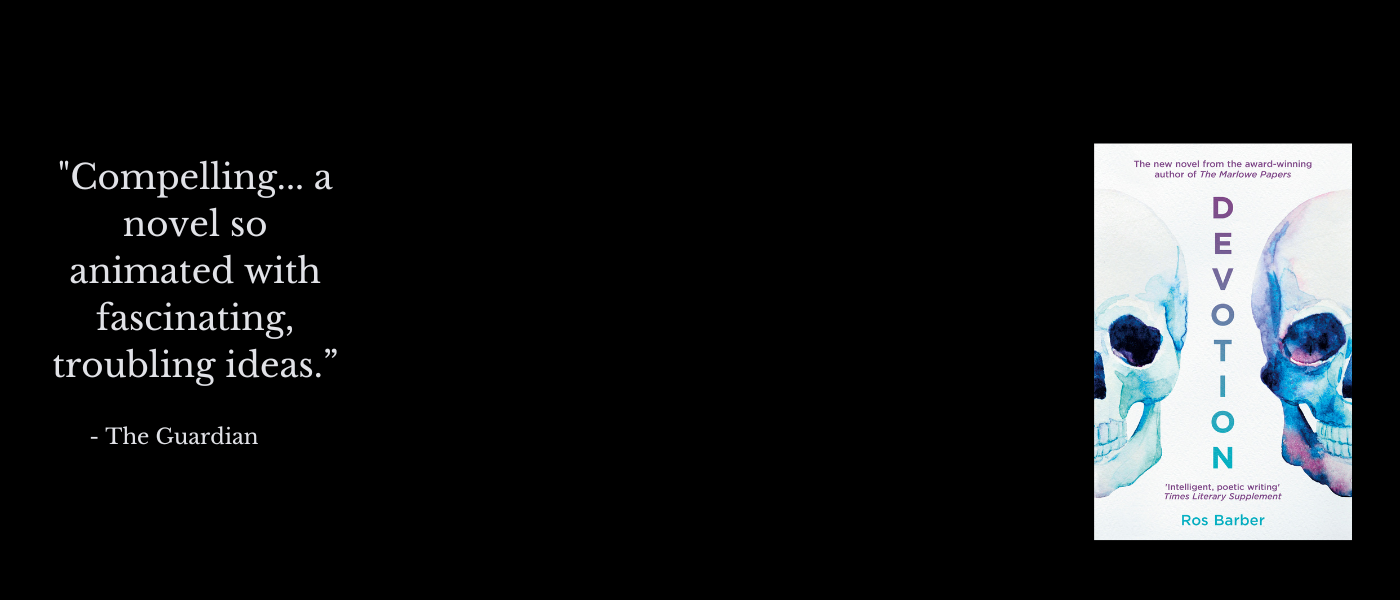 A couple of weeks ago I returned from London with The Marlowe Papers typescript as originally submitted to Sceptre, fresh with the pencil marks of my editor, Carole Welch, and ever since then, I’ve been working on my edits. Carole likes to do things the traditional way, so I’ve been working in pencil also, which is somewhat unusual for me. (I’ve been tracking changes in a new Word document nevertheless.)
A couple of weeks ago I returned from London with The Marlowe Papers typescript as originally submitted to Sceptre, fresh with the pencil marks of my editor, Carole Welch, and ever since then, I’ve been working on my edits. Carole likes to do things the traditional way, so I’ve been working in pencil also, which is somewhat unusual for me. (I’ve been tracking changes in a new Word document nevertheless.)
As I originally conceived it, The Marlowe Papers was supposed to have been a stash of papers written by Marlowe in Elizabethan cipher which I ‘translated’ into contemporary English. I didn’t want the language to be mock-Tudor, but nor did I want it to be anachronistic. Nothing, I hoped, would leap out as being too modern. Of course, I couldn’t stay in the poetic flow while looking up every word, and the work of telling the story effectively in blank verse was work enough, so very often I’d plain forget to consult the OED (online access to which was one of the happiest benefits of my being a student at the time). But after my own editing passes and those of five writer friends willing to offer opinions in return for an early glimpse of the book I’d been banging on about for four years, I didn’t think there’d be many linguistic wristwatch-equivalents left.
How wrong I was!
And how blessed I find myself in having an editor of Carole’s calibre, who can scent out a word from the mid-17th century (or later) from ten paces. Of course, now that they’re pencilled to my attention, I can’t understand how so many slipped past me (and my writer friends) without notice.
Let’s start with camouflage (1917), twice. (Clearly a word that was key to the English winning the First World War.) The excellent Evolving English exhibition, which I visited at the British Library earlier this year, had already alerted me to my error but I suppose I made a note in a notebook and, not being a person who submits easily to systems, forgot afterwards to read through my notes and thus change the text.
But Carole had found dozens and dozens of others, some of them embarrassingly obvious, others strangely illuminating. No-one could be befuddled or flummoxed until the 19th century, nor could a person complain of boredom until 1852. (Victorian industrialisation and suddenly a few wealthy folk have time on their hands like never before, I guess.) But who would have thought that 16th century folk couldn’t “sober up”; indeed, that no-one could do so until 1820? I wonder if that phrase was coined only with improved sanitation; for Elizabethan town water not being safe to drink, many Elizabethans – young and old, day and night, drank only beer.
We can tell something about a culture from its language, and though apparently it is untrue that eskimos have a larger number of words for snow than the rest of us, it struck me that pretty much every interesting way of saying something is ‘easy’ has etymological roots in the 20th century. A cinch, a snap, a breeze, a piece of cake – all come from the primary era of “labour-saving devices”. We didn’t even call a light wind ‘a breeze’ until the early 17th Century. I guess Elizabethan life just wasn’t that easy. They probably had half a dozen words for difficult that we can no longer find a use for. At several points in The Marlowe Papers I had characters give snappy 20th century phrases for ease, and every one of them had to be cut. Shame. But exactly as it should be.
There was some difficulty in the alcohol department too. Brandy existed (thanks to Dutch merchants) but was referred to as brandwine or brandwijn. Stick that in the text and watch your reader get thrown as if from a lively colt. Sherry also might be drunk, but as sherris. We let that stand as close enough. Elizabethans would refer to ‘spirits’ only in the sense of ghostly apparitions. So every drop of the harder stuff has become ‘liquor’. Which sounds strangely modern and American (but the excellent Searchable Shakespeare gives 22 occurences of it).
The first 100 or so pages of these edits were terribly hard going. Only a couple of words or phrases needed changing every page or so, yet I found even with online thesaurus, OED, and searchable Shakespeare to hand, I could still take 20-30 minutes finding a workable substitute (that also scanned – sometimes a line or two needed a rewrite in order to maintain the iambic pentameter). I wasn’t making my target of 35 pages a day, and was beginning to wonder if I would make my expected delivery date. But gradually the pencil marks thinned out, until I celebrated a run of 20 spotless pages. It became clear that the deeper I had gone into my Elizabethan world, the more I had become naturally imbued in the appropriate vocabulary.
Yes, no doubt, there will still be anomalies, and I expect people will want to write to me about them when the book is published. But I think we’re at the point now where only the most exquisite pedant is likely to be jarred. And I don’t mind that, truly. Everyone needs a hobby. But as I slide these tatty pages unto their jiffy bag to return the typescript for its next round of edits (copy editing) I breathe thanks to the incredible team at Sceptre – and most especially to Carole – who are helping me to make this book as good as it can possibly be.


I remember being delighted years ago to discover that stardom was older than boredom! Thank you for jogging my memory…
That’s a neat line, Charles, love it. And thank you!
Hi Ros, I just love reading your words. They flow so easily but always seem original. Living in France now I think i might have discovred the roots of Atishoo (or however you spell what we say when someone sneezes). I believe comes from the French A Tes Souhaits (pronounced quickly it sounds remarkably similar). It means effectively Bless You. re the eskimo words I believe they do have many words for snow simply because living in a land of snow and ice it makes to distinguish between all the myriad sorts. Wet snow, dry snow, frozen snow, slush etc etc. In fact we have quite a lot too but usually compound nouns rather than single words. Or maybe I am just making that up. A quick search on google shows no easy answers. Will let you know if I find the answer.
Love
S
Thank you for the compliment Stephen, and what an excellent piece of language forensics. Now I have to wonder whether “A Tes Souhaits” came over with the Normans in the 11th century, the Huguenots in the 16th, or swam the Channel at some other point. I love the way languages influence each other. I was interested to notice this last week how much English has infiltrated Spanish (and in which areas) – “futbol” for example, and a huge number of words related to sex (include “sexo” for the act itself). As for that old eskimo snow words myth, I’ve now hyperlinked to a rather lovely debunking of it, including a little exchange with Steven Pinker.
Hi there,
Thanks for the talk on writing a thesis today. I found a few things you mentioned really useful, such as fear being the source of procrastination. It really made me think. Good luck with this book (not sure what book you’re writing, but sounds interesting). I work daily with early modern material, and after the first year of seeing nothing but Black Letter and feeling as though it all merged into one big black blob, I can now undertand and actually enjoy reading it. All the best:)
Thank you Maria, I’m glad you found it useful. I’ve not taught this session before so it been great to get so much positive feedback. Nice that you googled me and stopped by. The book mentioned here is the novel in verse that I wrote as part of my doctorate – it’s being published by Sceptre in May. Exciting stuff. Next plan, after PhD corrections, is to expand the academic part of the DPhil into a tome of its own (and simultaneously begin another novel). I know what you mean about Black Letter. And then there’s Elizabethan handwriting! I remember going to the Bodleian for a research trip and coming away with only a fraction of the information I wanted because of my inability to decipher English secretary hand. Give me EEBO any day – even if there *is* a danger of getting lost in its fascinating byways! (Tip: before entering write a short note to yourself of what you’re actually looking for …. anything else that intrigues, make a note about it under a suitable section heading and plan to revisit it (if necessary) on another occasion!) Best of luck with yours.
Yes, I also went to the Bodleian a couple of times, but that was only to see material that is already on EEBO, which I had already read. I just wanted to feel the texts and see them. But as far as research is concerned, I would prefer EEBO any day too.
Thank you so much for that tip. The way I research is by putting a range of two dates – say 1553-1558, the years Mary reigned – and reading everything printed during that time, in order to see if there is anything I can use, which is related to my chapter themes. Because I do not know the material, and I do not know some of the authors, I need to read through each text and see if it is at all relevant. The danger with that, is rather than abandon the text when realising that it is not relevant, I end up reading it out of sheer interest. I have to stop that!
Looking forward to reading your book when published. I’ll mention it to a few people who may be interested:)
I can see why it’s become so time-consuming. You most definitely need to stop that!
If you sign up at TheMarlowePapers.com I’ll let you know when the book’s published (including any pre-publication offers I can rustle up!). Thanks again, Ros